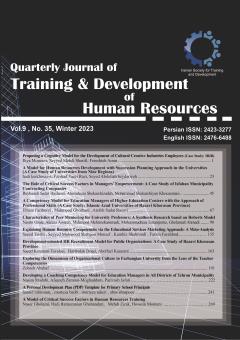Presenting a model for developing the coaching competencies of the education managers of the 22 districts of the mayor of Tehran
Subject Areas :
nasim madahi
1
,
afsaneh zamani moghadam
2
![]() ,
Parivash Jaafari
3
,
Parivash Jaafari
3
1 - PhD student in Educational Management, Faculty of Management and Economics, Science and Research Branch, Islamic Azad University, Tehran, Iran.
2 - Associate Professor, Department of Educational Management, Faculty of Management and Economics, Science and Research Branch, Islamic Azad University, Tehran, Iran.
3 - Associate Professor, Department of Educational Management, Faculty of Management and Economics, Science and Research Branch, Islamic Azad University, Tehran, Iran.
Keywords: Qualifications of coaching, coaching, development of competencies of training managers, empowerment of managers,
Abstract :
The purpose of this study is to provide a model for developing the coaching competencies of education managers in 22 districts of Tehran Municipality. Due to the nature of the subject, this research is descriptive and survey type. The tools used in this study are open interviews and a structured questionnaire. In order to collect information, Delphi interview was conducted with 30 national coaching experts using purposive sampling method. Then, the final model was distributed among 210 managers and education officials of Tehran Municipality using a questionnaire and was evaluated more extensively using structural equations in Amos24 software and validation factor analysis. Based on the results, the variables of coaching action competencies, behavioral-coaching competence, coach-executive competence and coach-monitoring competence were identified as variable dimensions of coaching competency development in Tehran Municipality education managers. The dimensions of the competitor's competencies are: individual and strategic analysis, setting strategic goals and developing operational plans. Transformational leadership, trust, active listening and strong questioning as components of the coach's behavioral competence, empowerment, development and encouragement and guidance in the performance as components of the coach's executive competence, as well as positive monitoring, negative monitoring and feedback as components The coach's ability to monitor was recognized.
1. Alwani, Mehdi; Khodami, Abdul Samad. Coaching is an effective approach in human resource management (concepts of principles and applications). Tehran: Jihaddaneshgahi Publications.1396.
2. Bickerich,kartin .Executive coaching during organizational chang:A qualititative study of sxecutives and coaches perspectives. International Journal of theory Research and practice.2017.
3. Coacho Utrilla,Pedro Nunez. The effects of coaching in employees and organizational performance: The Spanish Casa. Intangible capital..2015. 11(2).166-189.
4. Dolot,Anna. Coaching Process and its influence on employees 'Competencies in The hospital sector-case study. International journal of contemporary management.2017. vol16 (2).75-8.
5. Fadaei Kiwani, Reza and Sadat Eshkor, Seyedeh Zuleikha, 1396, the position of education in the development of human resources in modern organizations.
6. Hambach.J. Evaluation of Coaching success for the continuous improvement process –How to distinguish agood leade in CI?Procedia manufacturing. 2017 .(9).331-338.
7. Hosseini Amiri, Seyed Mahmoud and Darvish, Behrooz and Farokhi, Mohammad Rez. A Study of the Coaching Role of Senior Managers on Job Transfer with Emphasis on Employee Warmth Mediators and Colleagues Competence (Case Study: All Areas of Tehran Municipality), Third National Conference on Strategies Achieving sustainable development in Iranian architecture and urban planning, Tehran.1398.
8. Louis, D., & Fatien Diochon, P. The coaching space: A production of power relationships in organizational settings. Organization.2018. 25(6), 710-731.
9. Nwogo, O. O., & Kabari, J. B. Human Resource Training and Staff Performance in Ohaozara Local Government Area of Ebonyi State, Nigeria (2015-2019). International Journal of Innovative Analyses and Emerging Technology.2021. 1(6), 18-27.
10. Khosravi Pour, Bahman and Pour Fateh, Nasibeh, 2015, The necessity and role of education in the development and improvement of human resources, the first national conference on economics, management and humanities with the approach of applied knowledge, Tehran.
11. Renard,Laurent. Executive coaching for professional organization,PHD Thesis.school of humanities ,The American university of London.2005.
12. Roke woo,Hyung. Exploratory study examining the joint impact study examining the joint impacts of mentoring and managerial coaching on organizational commitment.2017.
13. Sangari, Negin; Puroli, Behrooz . The effect of manager's coaching behavior on results related to employee performance. Journal of Management and Development Process. (3). 171- 147.1393.
14. Vazifeh Doost, Hossein, Radmardghadiri, Gholam Hossein. Design and explain the conceptual model of management coaching and organizational trust in the context of organizational culture. Proceedings of the National Conference on Organizational Culture with a Developmental Approach. Tehran: Civilica Publications.1393.
15. Woulfin,Sarah.L.and Rigby,JESSICA.G. Coaching for conference:How Instructional coaches lead change in the evaluation Era.Educational Researcher.2017. vol20(10).1-6.
16. Wu, L., Chen, G., & Peng, S. Human Capital Expansion and Global Value Chain Upgrading: Firm‐level Evidence from China. China & World Economy.2021. 29(5), 28-56.
17. Yousefi, Mohammad Reza; Mashali, Behzad, Manti, Hossein. Investigating the possibility of implementing a coaching model in human resource training based on the data theory of the foundation (Case study of the Tax Affairs Organization). Tax Research Journal.1393. (34). Series 82. 257- 233.


